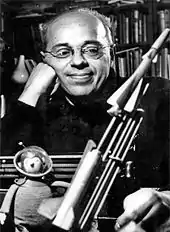Czas nieutracony
Czas nieutracony (title variously translated as Time Not Wasted, Time Not Lost, or Time Saved) is a trilogy novel of Stanisław Lem in the style of Socialist realism. First published in 1955, it consists of the novels Hospital of the Transfiguration, Among the Dead ("Wśród umarłych"), and Return ("Powrót").
The first volume was finished in 1948, to be published by Gebethner i Wolff publisher, but it was stopped by censorship.[1] Lem recalls endless travels to Warsaw to appease the censors,[2] but eventually he had to add two more parts, and as a result the trilogy was published three times (1955, 1957, and 1965).[1]
Hospital of the Transfiguration, finished in 1948, is a psychodrama about a young doctor, Stefan Trzyniecki, who worked in a psychiatric hospital during the Nazi occupation of Poland in the Second World War.
Among the Dead, finished in 1949, is the story a young mathematical genius, Karol Wilk, who works in an automobile shop. Professors want so save his talent against the war, but he wants to join the resistance. In an interview, Lem says that the story was based on his own experience of the time: after the school he worked in car shops, and had contacts with the underground.[3] In 2005 a part of this book, Operation "Reinhardt", was published in the collection volume Lata czterdzieste. Dyktanda of Lem's complete works, a tale about the Nazi plan for the deportation of Polish Jews into extermination camps and how it was being executed.
The novel Return was finished in 1950. An excerpt from it, Dyżur doktora Trzynieckiego ("Call Duty of Doctor Trzyniecki"), was also published in Lata czterdzieste. Dyktanda (2005).
References
- Stanisław Bereś, "Inteligent w Domu Wariatów: (soc)realistyczna trylogia Stanisława Lema", Acta Lemiana Monashiensis, a special edition of Acta Polonica Monashiensis, vol. 2, no. 2, 2002, Monash University
- Lem's commentary about the Hospital of Transfiguration
- Stanisław Lem, Tomasz Fiałkowski, "Świat na krawędzi. Ze Stanisławem Lemem rozmawia Tomasz Fiałkowski", Wydawnictwo Literackie, Kraków, 2000, p. 44.
